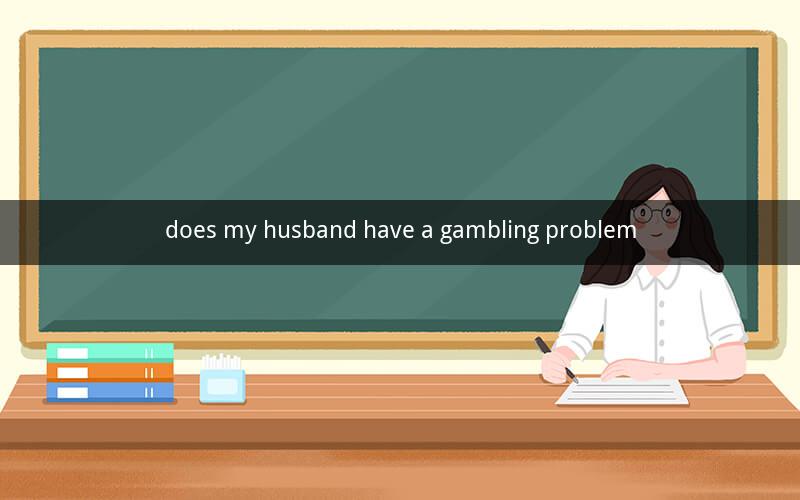
Table of Contents
1. Understanding Gambling Addiction
2. Signs of a Gambling Problem in Your Husband
3. The Impact of Gambling on Relationships
4. How to Approach Your Husband About His Gambling
5. Professional Help for Gambling Addiction
6. Support Systems for Gambling Addiction
7. Coping Strategies for Non-Gambling Partners
8. The Role of Therapy in Treating Gambling Addiction
9. The Importance of Patience and Understanding
10. Long-Term Recovery from Gambling Addiction
1. Understanding Gambling Addiction
Gambling addiction, also known as problem gambling, is a condition characterized by an inability to control or stop gambling despite negative consequences. It is a chronic and progressive disorder that can affect anyone, regardless of age, gender, or socioeconomic status. Understanding the nature of gambling addiction is crucial in addressing the issue effectively.
1. Signs of a Gambling Problem in Your Husband
Recognizing the signs of a gambling problem in your husband is the first step in addressing the issue. Some common signs include:
- Secretive behavior regarding finances
- Lying about gambling activities
- Missing work or social events due to gambling
- Increasing debt
- Neglecting family responsibilities
- Feeling anxious or irritable when unable to gamble
1. The Impact of Gambling on Relationships
Gambling addiction can have a devastating impact on relationships, including marriages. It can lead to increased stress, conflict, and emotional distance. Understanding the impact of gambling on your relationship is essential in seeking help and support.
1. How to Approach Your Husband About His Gambling
Approaching your husband about his gambling can be challenging, but it is an important step in addressing the issue. Here are some tips:
- Choose a calm and private setting
- Express your concerns clearly and without judgment
- Use "I" statements to avoid placing blame
- Listen to his perspective and show empathy
1. Professional Help for Gambling Addiction
Seeking professional help is crucial in treating gambling addiction. A therapist or counselor can provide guidance, support, and treatment options tailored to your husband's specific needs.
1. Support Systems for Gambling Addiction
Support systems, such as Gamblers Anonymous or other support groups, can provide additional support and resources for both the individual struggling with gambling addiction and their loved ones.
1. Coping Strategies for Non-Gambling Partners
As a non-gambling partner, it is important to develop coping strategies to manage the stress and emotional impact of your husband's gambling addiction. Some effective coping strategies include:
- Seeking support from friends and family
- Engaging in self-care activities
- Participating in counseling or support groups
- Setting boundaries and expectations
1. The Role of Therapy in Treating Gambling Addiction
Therapy plays a crucial role in treating gambling addiction. Cognitive-behavioral therapy (CBT) is particularly effective in helping individuals develop healthier coping mechanisms and address underlying issues contributing to their gambling addiction.
1. The Importance of Patience and Understanding
Treating gambling addiction is a long-term process that requires patience and understanding. It is essential to remain supportive and encourage your husband to seek help and engage in treatment.
1. Long-Term Recovery from Gambling Addiction
Long-term recovery from gambling addiction involves ongoing support, treatment, and self-care. It is important to continue monitoring your husband's progress and provide support as needed.
Questions and Answers
1. Q: Can gambling addiction be cured?
A: While there is no guaranteed cure for gambling addiction, it can be effectively managed and treated with the right support and resources.
2. Q: How can I help my husband stop gambling?
A: Encourage him to seek professional help, provide support, and create a safe and supportive environment for him to recover.
3. Q: Is it my fault that my husband has a gambling problem?
A: No, it is not your fault. Gambling addiction is a complex disorder that affects the individual struggling with it, not their loved ones.
4. Q: Can my husband's gambling addiction be genetic?
A: While genetics may play a role in some cases, gambling addiction is often influenced by a combination of factors, including environmental and psychological factors.
5. Q: How can I help my children cope with their father's gambling addiction?
A: Encourage open communication, provide support, and seek help from professionals who specialize in working with children affected by gambling addiction.
6. Q: Can therapy help my husband overcome his gambling addiction?
A: Yes, therapy, particularly cognitive-behavioral therapy (CBT), has been shown to be effective in treating gambling addiction.
7. Q: How long does it take to recover from gambling addiction?
A: Recovery from gambling addiction is a long-term process that can vary from person to person. Some individuals may experience a significant reduction in symptoms within a few months, while others may require ongoing support and treatment.
8. Q: Can my husband's gambling addiction cause legal problems?
A: Yes, gambling addiction can lead to legal problems, such as financial difficulties, illegal activities, or legal disputes. It is important to address these issues as part of the recovery process.
9. Q: How can I support my husband during his recovery?
A: Show patience, understanding, and empathy. Encourage him to seek help, participate in treatment, and engage in self-care activities.
10. Q: Is it normal to feel betrayed by my husband's gambling addiction?
A: Yes, it is normal to feel betrayed and hurt by your husband's gambling addiction. It is important to acknowledge these feelings and seek support to process them.